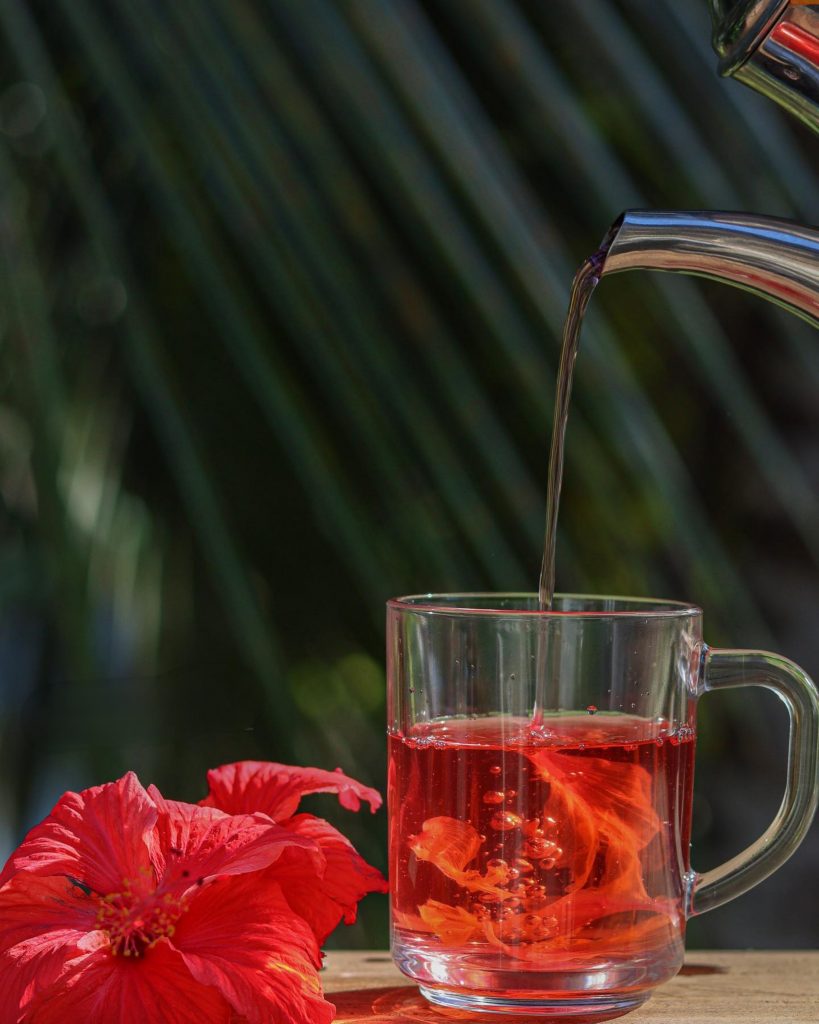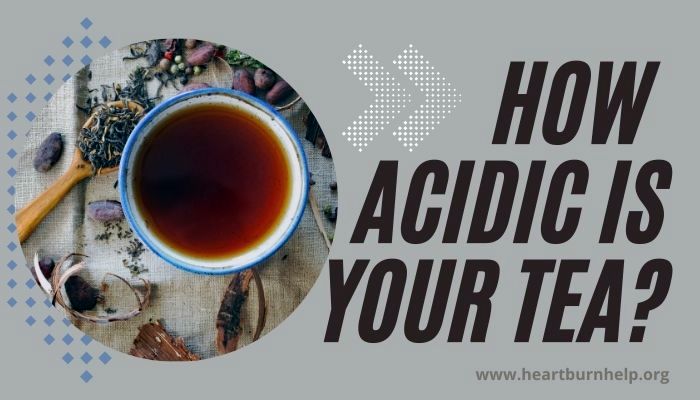Hibiscus tea is a refreshing acidic tea with many potential health benefits, although it may cause problems if you’re prone to acid reflux symptoms. Find out if hibiscus tea is a suitable drink for you.
In this article, you will learn about:
- the potential health benefits of hibiscus tea and its side effects
- how acidic is hibiscus tea and what is the pH level of hibiscus tea?
- ways to reduce the acidity of hibiscus tea.
What Is Hibiscus Tea?
Hibiscus tea is a caffeine-free herbal tea made from the dried flowers of the hibiscus plant. Fresh hibiscus flowers or leaves may also be used to make tea. Although all hibiscus flowers may be edible, the best variety to use for a cup of tea is Hibiscus sabdariffa L.
You can drink your cup of hibiscus tea hot, but it tastes equally delicious served as iced tea.
How Does Hibiscus Tea Taste?
If you enjoy sour drinks like lemon juice diluted in water, you’ll probably like hibiscus tea.
Hibiscus tea is a sour tea with a slightly sweet cranberry-like flavor. The reason hibiscus tea has a tangy, tart flavor is the tartaric acid, naturally found in many sour tasting fruits.

10 Health Benefits Of Hibiscus Tea
Hibiscus sabdariffa tea and hibiscus extract have many potential health benefits. Most research has been done on hibiscus extract, which may be more concentrated than hibiscus tea.
1. Lowers Blood Pressure
A well-known health benefit of hibiscus tea is its ability to lower blood pressure. Drinking three cups of hibiscus tea per day for six weeks lowers systolic blood pressure and diastolic blood pressure in pre-hypertensive and mildly hypertensive adults (1). Other studies found similar results (2).
If you take blood pressure medications, you should avoid hibiscus tea.
2. May Improve Heart Disease
Some studies have shown that drinking hibiscus tea increases good cholesterol and decreases bad cholesterol levels and triglycerides in diabetics and obese people, which may reduce your risk of heart attack and cardiovascular disease (3, 4). However, some clinical trials have not been able to replicate these results (5).
3. Fights Free Radicals That Cause Cancer
Antioxidants are compounds in your body that help fight free radicals, which damage your cells and may cause oxidative stress and cancer. Hibiscus tea is rich in the antioxidant anthocyanin, which gives the tea its red color.
Animal studies indicate hibiscus extract has powerful antioxidant properties which reduced the damage caused by free radicals by up to 92% (6). No research has been conducted on humans.
4. Anti-inflammatory Properties
Hibiscus extract contains vitamin C, known for reducing inflammation. Research on the anti-inflammatory properties of hibiscus extract has been proven on animals, but no human trials have been done (7, 8). Researchers suggest hibiscus extract may help manage chronic inflammatory diseases but more research is needed (9).
Vitamin C is sensitive to heat, so to get maximum benefit, don’t brew hibiscus tea for too long.
5. Boosts Immunity
Vitamin C powerful antioxidant that may also boost your immune system and keep colds and flu at bay.
6. Improves Liver Health
Human and animal studies have found that hibiscus extract may reducing liver damage associated with obesity, fatty liver disease, and liver steatosis (10).
7. Antibacterial Properties
Test tube studies have found hibiscus extract to be effective in treatine E. coli bacteria which causes gas, stomach cramps and diarrhea (11).
Another test tube study found hibiscus caylces (the middle of the flower) worked as well as some antibiotic medicines, and is a promising sources for new natural and effective antibacterial drugs (12).
Animal studies show that Hibiscus sabdariffa is an effective treatment for recurrent urinary tract infections (UTIs) (13).
8. Weight Loss
Hibiscus extract may aid weight loss and body fat loss. In a small clinical trial, overweight people consumed hibiscus extract for twelve weeks resulting in reduced body weight and abdominal fat. This was attributed to the antioxidant polyphenol compounds in hibiscus extract (13).
9. Diuretic
In clinical trails of animals with high blood pressure and high cholesterol levels, hibiscus extract acted as a diruetic. Diuretics typically reduce electrolyte levels in your body which can be dangerous; however, hibiscus extract didn’t have this effect (14).
10. Healthy Drink
A daily cup of hibiscus tea really packs a punch. Its sugar-free and caffeine-free and is rich in nutrients that have many potential health benefits.
Anthocyanins are antioxidant phenolic compounds which give hibiscus tea its red color, and may help lower blood sugar levels, and have anticancer, antimicrobial, and anti-obesity effects, as well as prevent heart disease (15). Hibiscus tea is also high in vitamin C which boosts your immune system and has anti-inflammatory properties.
Side Effects Of Too Much Hibiscus Tea
Drinking hibiscus tea in moderation is generally considered safe; however, the side effects of hibiscus tea are that it may interfere with medication and may affect some medical conditions. Be sure consult your health care provider before using hibiscus tea as herbal medicine.
Hibiscus tea, if drunk excessively, may cause liver damage.
Due to it’s acidity, if you are prone to acid reflux hibiscus tea may cause stomach upset and heartburn.
The acid in hibiscus tea can erode tooth enamel. Try rinsing your mouth with water after drinking hibiscus tea or drinking through a straw if you’re going to drink hibiscus tea frequently.
Avoid hibiscus tea if you have any of the following conditions:
- low blood pressure
- low blood sugar
- pregnant or breastfeeding
Hibiscus tea interacts with the following medication:
- blood pressure medication
- anti-diabetes medication
- chloroquine for malaria treatment
How Much Hibiscus Tea Is Safe To Drink?
Clinical studies showed three cups of hibiscus tea per day for six weeks was safe to drink without side effects for most people. However, there hasn’t been any research done to determine the maximum amount of hibiscus tea that is safe to drink.
Can You Drink Hibiscus Tea If You Have Acid Reflux?
If you suffer from acid reflux or are prone to stomach upsets, it is unlikely you’ll be able to drink much hibiscus tea, if any. The amount of hibiscus tea you can drink without side effects will depend on the severity of your symptoms.
Highly acidic drinks, such as hibiscus tea, are common acid reflux triggers that make your stomach produce more acid and loosen your lower esophageal sphincter, worsening acid reflux symptoms.

pH Level Of Tea
The pH scale, ranging from 1 to 14, measures acidity levels in food and beverages:
- 1 is most acidic
- 7 is neutral, neither acidic nor alkaline
- 14 is most alkaline or basic.
Is Hibiscus Tea Acidic?

Hibiscus tea is very acidic. Buddah Teas brand of hibiscus tea had a pH level of approximately 1.5 when I made it according to the directions on the box.
The hibiscus tea bag was steeped in one cup (8oz) of hot water for three minutes, and pH tested, then tested again at six minutes to see if there was a difference in pH level.
The pH test kit I used was very basic and the results are approximate.
I did not detect any visible difference in pH level between three and six minutes tests. However, tea does get more acidic the longer you steep your tea, so you may assume the tea steeped for 3 minutes wouldn’t be as acidic as tea steeped for 6 minutes.
How To Make Hibiscus Tea Less Acidic
Hibiscus tea is a delicious, refreshing tea that can be made less acidic by diluting the tea. When I added an additional half a cup of water, the pH level was 2. While still very acidic, this experiment demonstrated you can reduce the acidity level of hibiscus tea by diluting with water.
Using fresh Hibiscus sabradiffa flowers or loose hibiscus tea may also reduse the acidity of your tea.
You can also try steeping your hibiscus tea for a shorter time to reduce the acidity.

pH Level Of Common Teas
The table below shows you the different pH levels of the common teas.
| Types of Tea | Average Acidity Level (PH Value) |
| Hibiscus Tea | 1.5 – 2 |
| Commercially made, ready to drink teas e.g. iced tea or sweet tea | 2.9 – 3.4 |
| Black Tea | 4.9 – 5.5 |
| Green Tea | 4.9 – 5.5 |
| Earl Grey Tea | 4.9 – 5.5 |
| Oolong Tea | 5.5 – 7 |
| Chamomile Tea | 6 – 7 |
| Peppermint Tea | 6 – 7 |
| Rooibos Tea | 6 – 7 |
| Fennel teas | 6.7 – 7.1 |
| Yerba Mate Tea | 6.7 – 7.8 |
| Ginger Tea | 7 – 7.5 |
| White Tea | 8 – 10 |
| Matcha Tea | 9 (approx.) |
FAQS About Hibiscus Tea
When is the best time to drink hibiscus tea?
Becasue hibiscus tea is caffeine-free, you can drink it at any time of the day. However, if you are prone to acid reflux or have a sensitive stomach, a cup of hibiscus tea would be best avoided on an empty stomach due to its acidity.
Is hibiscus tea good for acid reflux?
Unless you have very mild acid reflux symptoms, hibiscus tea will probably cause problems due to its acidity. Hibiscus tea is very acidic and will stimulate stomach acid production and loosen your lower esophageal sphincter, causing acid to backflow into your esophagus, causing irritation and possibly heartburn.
Does hibiscus tea have acid?
Hibiscus tea is very acidic. It contains natural organic acids such as tartaric acid which is responsible for the tea’s tart taste. Hibiscus tea is also high in ascorbic acid, also called Vitamin C, which boosts your immune system and has anti-inflammatory properties. It also contains tartaric acid, responsible for its sour taste.
Is there caffeine in hibiscus tea?
There is no caffeine in hibiscus tea. Hibiscus tea will only contain caffeine if it is blended with traditional teas that contain caffeine such as black tea, white tea, or green tea, or herbal teas that contain caffeine such as yerba mate.
Is it OK to drink hibiscus tea daily?
Most people should be able to drink hibiscus tea daily. However the acidity of hibiscus tea may be too much if you are prone to acid reflux. Since everyone is different, the only way to know for sure is to try it for yourself, and if it causes problems, stop drinking hibiscus tea, or drink less.
Is hibiscus tea safe during pregnancy?
It is best to avoid hibiscus tea and hibiscus extract during pregnancy or if you are breastfeeding. Studies on rats showed that effect of hibiscus on offspring delayed the onset of puberty and increased the risk of obesity due to changes in hormones in breast milk(16). Hibiscus extract may stimulate menstruation, so for pregnant women, this is something you don’t want to mess with (17).
What Herbal Tea Blends Can I Make With Hibiscus Tea?
Hibiscus tea is often mixed with other ingredients to make interesting herbal tea blends. Mint, lemon, lemon balm, lemon verbena, lime, rosehip, lemongrass, and orange blend well with hibiscus.
These herbal blends are mostly acidic and unsuitable for an alkaline diet or for acid reflux sufferers.
Summary: Is Hibiscus Tea Acidic?
Hibiscus tea is a very acidic drink, with a pH level of approximately two, although you can make it less acidic by adding extra water or steeping your tea bag for a shorter time. Hibiscus tea is unsuitable if you follow an alkaline diet, have diabetes, or take blood pressure medications. It may also be problematic if you suffer from acid reflux symptoms.

